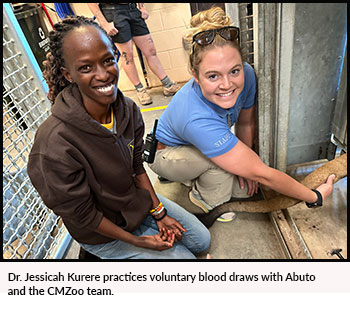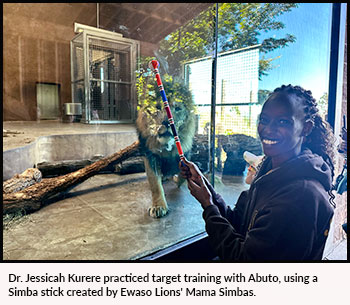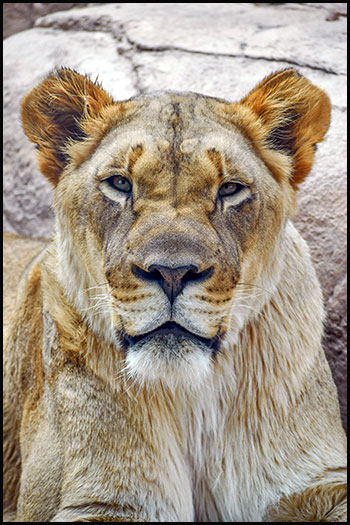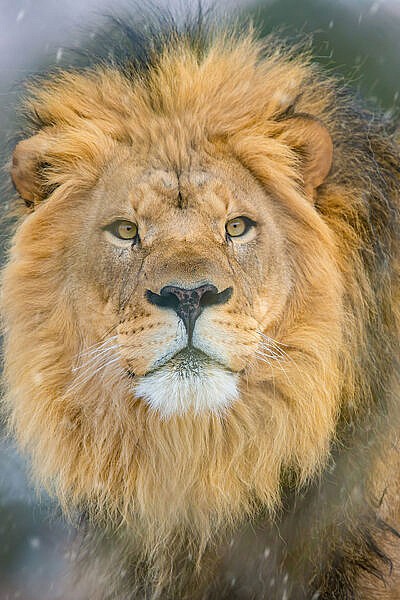Ewaso Lions is a longtime member-supported conservation organization in Kenya dedicated to conserving lions and other large carnivores by promoting coexistence between people and wildlife. They provide local communities with conservation advocates, transportation, veterinary equipment and vaccinations for pet dogs, among other things. Since 2017, CMZoo members have sent more than $80,000 to support their important conservation work through the annual Member Conservation Vote.

In October, Dr. Jessicah Kurere, the lead veterinarian for Ewaso Lions’ domestic animal mobile veterinary unit, spent a few days on the mountain to inspire, educate and even practice some veterinary techniques that could help animals in the wild.
In the U.S., many learn about the plight of iconic African animals, like African lions, elephants and giraffe, and it can be hard to understand why they aren’t better protected. By connecting with people like Dr. Kurere, more animal advocates can start to understand how difficult it must be for communities to live with these animals, no matter how revered they are in other parts of the world.

“In Colorado, we share recreational and living spaces with wild bears and mountain lions, so we can understand the struggles that might arise when human-wildlife conflicts inevitably occur anywhere in the world,” said Amy Schilz, senior animal behaviorist at the International Center for the Care and Conservation of Giraffe at Cheyenne Mountain Zoo. Schilz worked with the African lions at CMZoo for 10 years before embarking on her journey at The Center, and has maintained a relationship with the team at Ewaso Lions. “In Kenya, they’re choosing to live with wildlife and share the landscape. If we consider the number of bear-human conflicts we hear about in our home state and relate that to native African animals and the pastoral farming communities that live amongst them, it’s easier to understand.”
Ewaso Lions works to help locals understand, respect and coexist with native African species. According to Ewaso Lions, the African lion population has declined by 43% in the last 20 years and lions now occupy only 8% of their historical range in Africa. The estimated number of lions across Africa is approximately 20,000. In Kenya, the national population now numbers less than 2,500 individuals. This reduction in lion numbers is primarily due to habitat loss and conflict with humans, typically when lions kill people’s livestock.

During her visit, Dr. Kurere met with staff, Teen Program participants and docents, sharing stories of helping livestock injured by lions from her mobile vet clinic, complete with a flip-down exam table that hangs from the side of the van. In addition to the conservation programs detailed below and others, Ewaso Lions jumps in to assist wildlife in emergencies. They dig wells for wildlife during droughts and rehabilitate struggling grasslands, which attract hoof stock to wildlands and thus, lions away from communities and toward those food sources, hopefully helping to restore the natural ecosystems that animals and people need to thrive.
“Hearing her passion and the stories from the field brings us all closer to the important work our Zoo members are supporting,” said Schilz. “Dr. Kurere told us about an entire pack of African painted dogs that contracted canine distemper and passed away, and the work they’re doing with Kura’s Pride vaccinations is helping to address that.”
In between updating staff on the progress of Ewaso Lions, Dr. Kurere worked closely with big cat keepers in African Rift Valley, sharing what she knows about wild lion behaviors and assisting with voluntary blood draws on Abuto, CMZoo’s 12-year-old African lion patriarch.
During blood draw training, the team asks Abuto to enter an open-ended mesh tunnel, which he always has the choice to leave if he wants to. Communicating the steps with Abuto throughout the process– and feeding him lots of yummy snacks – the team asks him to position himself so he can present his tail through a small port at the bottom of the mesh.

“It was very different from what I am used to, but very exciting,” said Dr. Kurere. “I was fascinated with the trust and ease he presented his tail for blood draws. That makes it very easy to give him medical exams. It was my second time to draw blood on a lion, but certainly the first-time drawing blood on a wild carnivore wide awake!”
Dr. Kurere has been assisting a local veterinarian in Kenya on clinical cases in lions and other wildlife, and this experience with Abuto is another way she’s continuing to gain more skills in wildlife clinical practice.
The benefit to wild lions doesn’t end there. Because Abuto and the rest of the pride – 16-year-old matriarch, Lomela, and their 8-year-old daughter, Elsa, and son, Aslan – inspire new African lion advocates every day by connecting with CMZoo guests. Furthermore, through the CMZoo members who have developed relationships with CMZoo’s lion pride and voted to support Ewaso Lions in the annual Member Conservation Vote, they are making a direct impact by supporting Ewaso Lions’ imperative conservation efforts.

Ewaso Lions hosts a variety of programs that monitor and protect wildlife, connect communities to conservation and lift up underserved populations, and provide veterinary care to local pets, livestock and wildlife.
Mama Simba – which means “Mothers of Lions” in Swahili – is one of their programs, which provides a platform for traditional women to reclaim their place as the owners and protectors of wildlife, through environmental literacy, lion habitat recovery activities, engagement and awareness work on coexistence and culture.
Warrior Watch is a community-led program that engages Samburu warriors – a group traditionally neglected, overlooked or blamed for wrongdoing – in conservation decision-making. The program builds on the warriors’ traditional protection role by increasing their ability to mitigate human-carnivore conflict. The Warriors serve multiple communities, informing herders of lion presence so they can avoid certain areas, averting depredation. This network also monitors threatened species and records conflict incidents over a wide-ranging area. Following lion attacks on livestock, Warriors encourage herders not to take retaliatory action and work with them to prevent future livestock attacks.
Lion Kids Camp are five-day camps that teach tomorrow’s conservationists about peaceful wildlife coexistence. Most Kenyan children, despite living in close proximity to world famous national parks and reserves, have never had the chance to observe wildlife at close range. Instead, they are exposed to negative interactions between wildlife, livestock and people, which shape their perceptions of wildlife. The program empowers a new generation of wildlife ambassadors by engaging young people in environmental education and long-term conservation values.

Kura’s Pride provides vaccinations for local pets, with a goal to reduce the spread of diseases like canine distemper and rabies among beloved pets and wildlife.
“At our Zoo, we have the privilege of knowing Abuto as an individual and witnessing how incredible he is,” said Schilz. “Dr. Kurere and the Ewaso Lions team are saving the world’s wild ‘Abutos.’ I picture every single lion being as beautiful and amazing as he is, and that’s who she and our members are protecting. She’s our hero, and no matter how old you are, it always reignites your passion to save wildlife and wild places when you meet your wildlife heroes.”

